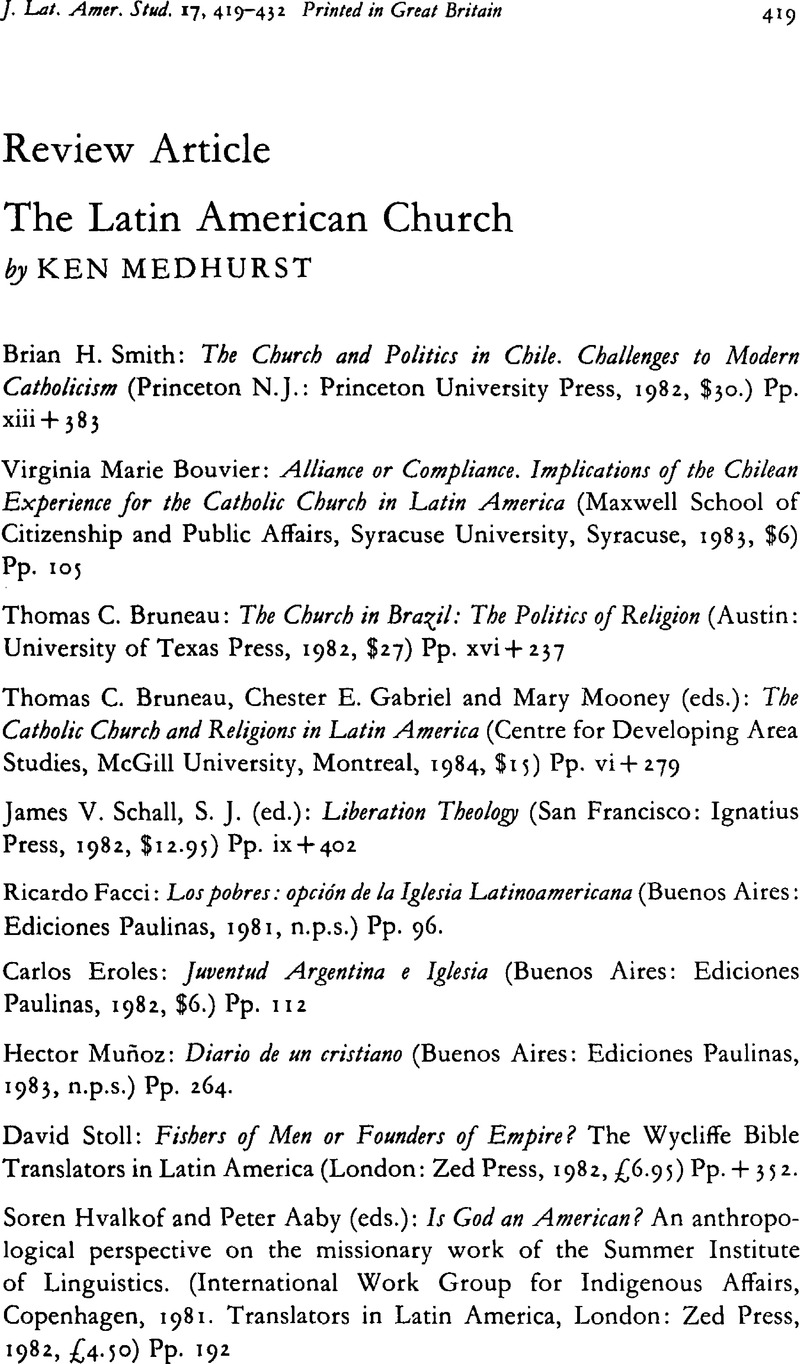Article contents
The Latin American Church
Published online by Cambridge University Press: 05 February 2009
Abstract

- Type
- Review Article
- Information
- Copyright
- Copyright © Cambridge University Press 1985
References
1 Cf. Mecham, J. Lloyd. Church and State in Latin America (rev. ed. Chapel, Hill, University of North Carolina Press, 1966).Google Scholar
2 On the subject of the Church and Christian Democracy, cf. Wayland-Smith, Giles, The Christian Democratic Party in Chile (Cuernavaca, Centro Intercultural de Documentación, 1969)Google Scholar and Williams, Edward J., Latin American Christian Democractic Parties (Knoxville, University of Tennessee Press, 1967).Google Scholar On the Church as a pressure group, cf.Behrman, Lucy C., ‘The Political and Social Impact of the Peoples' Priests in Chile’, in Donald, E. Smith (ed.), Religion and Political Modernization (New Haven, Yale University Press, 1974).Google ScholarGrayson, George W., ‘The Church and Military in Peru’, in Smith, Donald E., op. cit.;Google ScholarSanders, Thomas G., ‘Catholic Innovation in a Changing Latin America (Cuernavaca, Centro Intercultural de Documentación, 1970);Google ScholarCarlos, Astiz, ‘The Catholic Church Latin American Politics: a Case Study of Peru’, in David H., Pollock and Arch, Ritter, (eds.), What Kind of Revolutions? (New York, Praeger, 1973);Google ScholarEmanuel de, Kadt, Catholic Radicals in Brazil (London, Oxford University Press, 1970).Google Scholar Examples of élite studies are Frederick C., Turner, Catholicism and Political Development in Latin America (Chapel Hill, University of North Carolina Press, 1971);Google ScholarHubert, Schwan and Antonio, Ugalde ‘Orientations of the Bishops of Colombia to Social Development, 1930–;1970’, Journal of Church & State Vol. 16, no. 3 (1974), pp. 473–92.Google Scholar For the Church from an organisational viewpoint, cf.Einaudi, Luigi et al. Latin American Institutional Development: The Changing Catholic Church (Santa Monica, The Rand Corporation, 1969)Google ScholarDavid, E. Mutchler, The Church as a Political Factor in Latin America: With Particular Reference to Colombia and Chile (New York, Praeger, 1971).Google Scholar
3 Cf. Vallier, Ivan, Catholicism, Social Control and Modernization in Latin America (Englewood Cliffs, NJ, Prentice-Hall, 1970),Google Scholar and also the same author's ‘Extraction, Insulation and Re-entry: Toward a Theory of Religious Change’, in Henry, Landsberger (ed.), The Church and Social Change in Latin America (Notre Dame, Ind., University of Notre Dame Press, 1970).Google Scholar
4 Cf. Levine, Daniel H., Religion and Politics in Latin America: The Catholic Church in Venezuela and Colombia (Princeton, Princeton University Press, 1981).CrossRefGoogle Scholar
5 Cf.Beeson, Trevor and Pearce, Jenny, A Vision of Hope. The Churches and Change in Latin America (London, Fount Paperbacks, 1984).Google Scholar
6 Bruneau, Thomas C., The Political Transformation of the Brazilian Catholic Church (Cambridge, Cambridge University Press, 1974).Google Scholar
7 On the subject of ‘Liberation Theology’, cf. Gutiérrez, Gustavo, A Theology of Liberation (London, SCM, 1974)Google Scholar and Rosino, Gibillini (ed.), Frontiers of Theology in Latin America (London, SCM, 1980).Google Scholar
8 Cf. Berryman, Philip, The Religious Roots of Rebellion (London, SCM, 1984).Google Scholar
9 Cf. Dodson, Michael, ‘The Christian Left in Latin American Politics’, in Daniel, H. Levine (ed.), Churches and Politics in Latin America (London, Sage, 1979).Google Scholar
- 2
- Cited by




